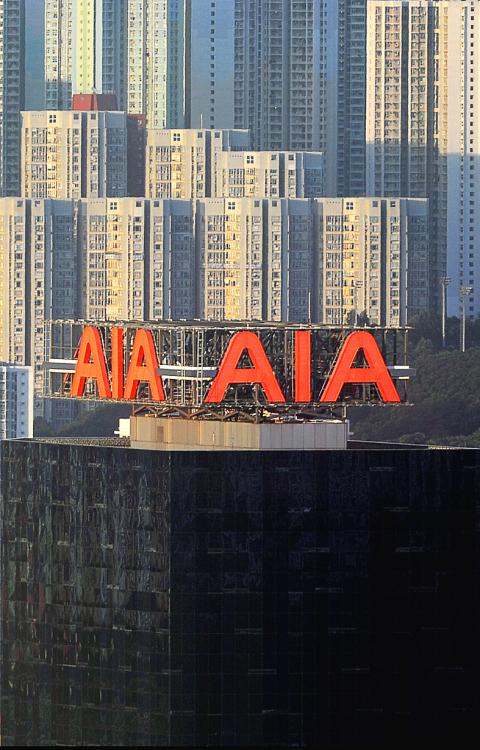The Asian unit of troubled US insurer AIG has raised US$20.5 billion in a Hong Kong share sale that was the world’s third-biggest initial public offering (IPO), a spokeswoman said yesterday.
Some of the cash from AIA’s huge IPO will go toward helping its parent pay off a US$182 billion bailout it received from the US taxpayer at the height of the global financial crisis.
AIG said on Monday it had also raised US$16.2 billion by selling unit American Life Insurance Company (ALICO) to MetLife Inc.

PHOTO: AFP
BAILOUT PAYMENT
The repayment of the huge sums handed out to troubled US companies is a priority for the embattled administration of US President Barack Obama, which faced voter anger at mid-term elections yesterday in the US.
AIG was forced to look at -floating AIA in Hong Kong after the collapse in June of a proposed US$35.5 billion sale to British insurer Prudential.
AIA raised US$17.8 billion in the sale last month, but said at the time the IPO could top US$20 billion if certain options were exercised.
The IPO “raised US$20.51 billion after the exercise of the greenshoe option, which brings the total number of shares offered to about 8.08 billion,” an AIA spokeswoman said yesterday.
Peter Lai (黎永良), sales director at DBS Vickers in Hong Kong, said: “Many institutional investors had to buy shares [after the IPO] as the portion of shares set aside for them was quite small.”
In July, Agricultural Bank of China (中國農業銀行) claimed title to the world’s biggest IPO with a monster US$22.1 billion offering, beating the previous record set by Industrial and Commercial Bank of China (中國工商銀行), which raised US$21.9 billion in 2006.
GENERAL MOTORS
Separately, the sale of General Motors (GM) stock is expected to raise about US$10 billion in an IPO that will reduce the US government’s stake in the automaker to below 50 percent, three people briefed on the sale said on Monday.
GM common stock is expected to sell for between US$26 and US$29 a share when the IPO takes place around Nov. 18, according to the three people, who asked not to be identified because they are not authorized to speak on the matter.
That would value the company at more than US$46 billion — roughly on par with crosstown rival Ford Motor Co.
US taxpayers, who bailed out GM last year, would see their ownership stake drop from 61 percent to around 43 percent, not including any extra allotment of shares bankers could offer to satisfy strong demand, the people said.
GM and its bankers will begin a “road show” to woo investors in the IPO later this week.
The show, which could begin as early today, will be aimed at hedge, pension and mutual funds, but presentations are expected for individual investors. Common shares worth roughly US$2 billion would be sold to investors in the Middle East, Europe and Asia, one of the people said.
The expected price range of the IPO is higher than a forecast given by GM chairman Ed Whitacre last month. He said each share would sell for between US$20 and US$25.
Bankers leading the sale are recommending that the final share price be revealed on Nov. 17 and the sale take place a day later, the people said.

BYPASSING CHINA TARIFFS: In the first five months of this year, Foxconn sent US$4.4bn of iPhones to the US from India, compared with US$3.7bn in the whole of last year Nearly all the iPhones exported by Foxconn Technology Group (富士康科技集團) from India went to the US between March and last month, customs data showed, far above last year’s average of 50 percent and a clear sign of Apple Inc’s efforts to bypass high US tariffs imposed on China. The numbers, being reported by Reuters for the first time, show that Apple has realigned its India exports to almost exclusively serve the US market, when previously the devices were more widely distributed to nations including the Netherlands and the Czech Republic. During March to last month, Foxconn, known as Hon Hai Precision Industry

Taiwan Semiconductor Manufacturing Co (TSMC, 台積電) and the University of Tokyo (UTokyo) yesterday announced the launch of the TSMC-UTokyo Lab to promote advanced semiconductor research, education and talent development. The lab is TSMC’s first laboratory collaboration with a university outside Taiwan, the company said in a statement. The lab would leverage “the extensive knowledge, experience, and creativity” of both institutions, the company said. It is located in the Asano Section of UTokyo’s Hongo, Tokyo, campus and would be managed by UTokyo faculty, guided by directors from UTokyo and TSMC, the company said. TSMC began working with UTokyo in 2019, resulting in 21 research projects,

Ashton Hall’s morning routine involves dunking his head in iced Saratoga Spring Water. For the company that sells the bottled water — Hall’s brand of choice for drinking, brushing his teeth and submerging himself — that is fantastic news. “We’re so thankful to this incredible fitness influencer called Ashton Hall,” Saratoga owner Primo Brands Corp’s CEO Robbert Rietbroek said on an earnings call after Hall’s morning routine video went viral. “He really helped put our brand on the map.” Primo Brands, which was not affiliated with Hall when he made his video, is among the increasing number of companies benefiting from influencer

Quanta Computer Inc (廣達) chairman Barry Lam (林百里) yesterday expressed a downbeat view about the prospects of humanoid robots, given high manufacturing costs and a lack of target customers. Despite rising demand and high expectations for humanoid robots, high research-and-development costs and uncertain profitability remain major concerns, Lam told reporters following the company’s annual shareholders’ meeting in Taoyuan. “Since it seems a bit unworthy to use such high-cost robots to do household chores, I believe robots designed for specific purposes would be more valuable and present a better business opportunity,” Lam said Instead of investing in humanoid robots, Quanta has opted to invest